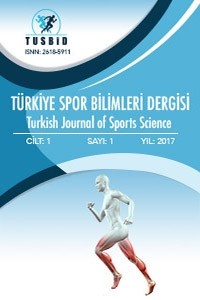Müziğin Maksimal Koşu Performansına Ve Egzersiz Sonrası Toparlanma Hızına Etkisi
Bu çalışma genç sedanter bireylerde müziğin egzersiz performansı üzerindeki etkisini değerlendirmeyi amaçlamıştır. Bu çalışmada, genç kadın erişkinlerde farklı tempodaki müziğin maksimum egzersiz süresi, maksimal kalp atım hızı ve egzersiz sonrası pasif toparlanma üzerindeki etkisi incelenmiştir. On iki sağlıklı kadın katılımcı statik gürültü (kontrol), hızlı tempo müzik ve yavaş tempo müzik olmak üzere rastgele seçilmiş üç denemeye katıldı ve her deneme, maksimum koşu bandı egzersizi ve egzersiz sonrası toparlanma dönemlerinden oluştu. Tüm denemelerde dinlenik kalp atım hızı, maksimum egzersiz süresi, maksimum kalp atım hızı ve egzersiz sonrası kalp atım hızı kaydedildi. Egzersiz sırasında hızlı tempo müzik dinlenmesi, daha yüksek bir kalp atım hızı ve egzersiz süresi (Tekrarlanan ölçümlerde ANOVA, p <0.05) ile sonuçlanmıştır. Farklı müzik şiddetleri arasında toparlanma Kalp atım hızı verileri incelendiğinde Tekrarlanan ölçümlerde ANOVA sonuçlarında zaman (p <0.05) ve deneme ve zaman etkileşiminin (P <0.05) olduğu görülmüştür. Bu sonuçlar bize denemeler arasında fark olduğunu göstermektedir. Bu farkın nereden kaynaklandığını bulmak için yapılan Post-hoc analizi sonucu hızlı müzik egzersiz denemesi ve yavaş müzik egzersiz denemesi ile hızlı müzik denemesi ve kontrol denemesi arasında anlamlı fark olduğu görülmüştür (p<0.05). Sonuç olarak, maksimal egzersiz sırasında hızlı tempo müzik dinlemek, egzersiz süresinin uzamasına ve maksimal kalp atım hızının artmasına neden olabiliyor iken, egzersiz sonrası yavaş tempo müzik dinlemek toparlanma hızını arttırabilmektedir.
Anahtar Kelimeler:
Müzik temposu, koşu hızı, kalp atım hızı
Influence Of Music On Maximal Running Performance And Post-Exercise Recovery Rate
In present study, tried to evaluate the effect of music on exercise performance in young untrained subjects. In this study, we tested the effect of different tempo music on maximal exercise time duration, heart rate and passive post-exercise recovery rate in young female adults. Twelve healthy female participants completed three randomly assigned trials: static noise (control), fast tempo music and slow tempo music. Each condition consisted of maximal treadmill exercise and post-exercise recovery periods. Resting heart rate, maximal exercise time duration, peak heart rate and recovery heart rate was recorded in each trials. Listening to fast tempo music during exercise resulted in a higher peak heart rate, and exercise time duration (Repeated-measures ANOVA, p<0.05). Repeated Measures ANOVA revealed a main effect of time (p<0.05), and a trial and time interaction (P<0.05) for recovery heart rate, indicating that responses differed over time between trials. Post-hoc analysis indicated significant differences between fast music exercise trial and slow music exercise trial and between fast music trial and control trial (p<0.05) Listening to fast tempo music during maximal exercise can increase exercise time duration and Peak heart rate while listening to slow tempo music after exercise can accelerate the recovery rate back to resting levels.
Keywords:
Music tempo Running speed, Heart rate, Recovery rate,
___
- Edworthy, J. & Waring, H. (2006). The effects of music tempo and loudness level on treadmill exercise. Ergonomics , 49 (15), 1597-1610.
- Fritz, T. H. Bowling, D. L., Contier, O., Grant, J., Schneider, L., Lederer, A., et al. (2018). Musical Agency during Physical Exercise Decreases Pain. Frontiers in Psychology , 8, 1-9.
- Jia, T1. Ogawa Y. Miura M. Ito O. Kohzuki, M. (2016) Music Attenuated a Decrease in Parasympathetic Nervous System Activity after Exercise. PLoS One. ;11(2):e0148648. doi: 10.1371/journal.pone.0148648. eCollection 2016.
- Jones,L. Tiller, NB. Karageorghis, CI. (2017). Psychophysiological effects of music on acute recovery from high-intensity interval training. Physiol Behav. 2017 Mar 1;170:106-114. doi: 10.1016/j.physbeh.2016.12.017.
- Karageorghis, CI. Bigliassi, M. Guérin, SMR. Delevoye-Turrell, Y. Brain(2018, Oct) mechanisms that underlie music interventions in the exercise domain. Prog Brain Res. 2018;240:109-125. doi: 10.1016/bs.pbr.2018.09.004.
- Karageorghis, C. I., & Priest, D.-L. (2012). Music in the exercise domain: a review and synthesis (Part I). International Review of Sport and Exercise Psychology , 5 (1), 44-66.
- Koç, H., CURTSEİT, T., MAMAK, H. (2011). Submaksimal Efor Sırasında Farklı Tip Müziğin Bazı Fizyolojik Parametreler Üzerine Etkisi. Selçuk Üniversitesi Beden Eğitimi ve Spor Bilimleri Dergisi , 211-215.
- Lee, K. Ahn, H.Y., Kwon, S. (2017). Music's Effect on Exercise Participants by Exercise Session. Journal of Applied Sport Psychology , 29 (2), 167-180.
- Lee S, Kimmerly. (2016) DSInfluence of music on maximal self-paced running performance and passive post-exerciserecovery rate. J Sports Med Phys Fitness. , 56(1-2):39-48.
- Loizou, G. Karageorghis, CI. (2015) Effects of psychological priming, video, and music on anaerobic exercise performance. Scand J Med Sci Sports. ;25(6):909-20. doi: 10.1111/sms.12391.
- Lopes-Silva, JP. Lima-Silva, AE. Bertuzzi, R. Silva-Cavalcante, MD.(2015) Influence of music on performance and psychophysiological responses during moderate-intensity exercise preceded by fatigue. Physiol Behav.139:274-80. doi: 10.1016/j.physbeh.2014.11.048.
- Smirmaul, BP. Dos Santos RV. Da Silva Neto, LV. (2015). Pre-task music improves swimming performance. J Sports Med Phys Fitness, 55(12):1445-51.
- Smirmaul, BP (2016). Effect of pre-task music on sports or exercise performance. J Sports Med Phys Fitness. 2017 Jul-Aug;57(7-8):976-984. doi: 10.23736/S0022-4707.16.06411-2.
- Stork, MJ. Kwan, MY. Gibala, MJ. Martin Ginis, KA. (2015) Music enhances performance and perceived enjoyment of sprint interval exercise. Med Sci Sports Exerc. May;47(5):1052-60. doi: 10.1249/MSS.0000000000000494.
- Stork, MJ. Martin Ginis, KA. (2017) Listening to music during sprint interval exercise: The impact on exercise attitudes and intentions. J Sports Sci. 2017 Oct;35(19):1940-1946. doi: 10.1080/02640414.2016.1242764.
- Başlangıç: 2017
- Yayıncı: İrfan YILDIRIM
Sayıdaki Diğer Makaleler
Beden Eğitimi ve Spor Öğretmeni Adaylarının Akademik Öz-Yeterlik Düzeylerinin Belirlenmesi
Oğuzhan EROĞLU, Yunus YILDIRIM
Basketbolcularda Tutkunluk ve Zihinsel Dayanıklılığın Tükenmişliği Belirlemedeki Rolü
Ebru KURTULGET, Gizem KAPLAN, Fatma ÇEPİKKURT
Müziğin Maksimal Koşu Performansına Ve Egzersiz Sonrası Toparlanma Hızına Etkisi
Serife VATANSEVER, Şenay ŞAHİN, Kaan AKALP, Furkan Can ŞENTÜRK
Satranç Oyununa Yönelik Tutum Ölçeği Geliştirilmesi
Reşat SADIK, Yavuz ÖNTÜRK, Fatih DİNÇ, Ali ÖZEN
